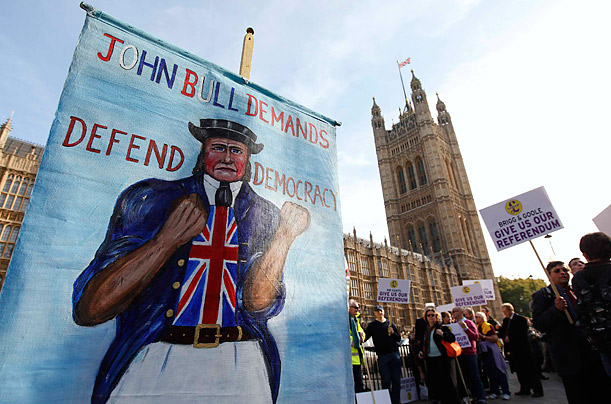Anti-European Union demonstrators wait to go into The Houses of Parliament in London October 24, 2011. (Photo: Suzanne Plunkett / Reuters)
It wasn’t quite Tahrir Square or Zuccotti Park, but the Oct. 24 uprising that saw 81 Conservative MPs defy their party leadership to support a rebel motion calling for a referendum on U.K. membership of the European Union may well signal the end of politics as we know it. That’s not because of the ostensible cause of the rebellion—a substantial and growing minority of Conservatives disagree with their leader, Prime Minister David Cameron, that Britain’s “national interest is to be in the E.U., helping to determine the rules governing the single market,” as he insisted moments ahead of the House of Commons debate. The break-up of European political structures would certainly send violent percussive waves across the world. But the deeper significance of what one might call the Westminster Spring lies in the rise of the unbiddable mainstream maverick.
The phenomenon has left political parties everywhere struggling to maintain discipline. Their representatives vaunt independence of mind as a virtue. Amid crashing markets and gathering storms, national leaders are seeking to restore confidence by assuring their citizens they have everything under control. They can’t even control their own backbenches.
Cameron’s ill-judged decision to force a confrontation with his rebels was inspired by his determination to buck that very trend. He could so easily have ignored the debate on backbencher David Nuttall’s call for a referendum, originally scheduled for Oct. 27, when the Prime Minister will be traveling. And the motion stood little chance of success despite fears of a Tory split. A majority of MPs from the Labour party and from the Conservatives’ coalition partners, the Liberal Democrats, were expected to oppose it. Even if some unforseen fluke had seen it approved, the resolution would not have been binding.
But Prime Ministers are haunted by history, and Cameron’s dreams are troubled by a thin gray vision from the past called John Major. Britain’s last Conservative Prime Minister barely prevailed against a hard core of Euroskeptics in the parliamentary party. Their biggest rebellion, in May 1993, saw 41 MPs defy Major’s wishes. Cameron calculated that the best way to stamp out the threat of similar dissidence in future was to challenge it head-on. The debate was duly moved to an earlier date, enabling him to attend and his Foreign Secretary William Hague to make the government’s case. That could have been a smart move. But the Tory leadership made a fatal error. Along with Labour and Lib Dem authorities, they imposed a three-line whip, ordering their MPs to vote against the motion or risk sanctions, even expulsion from party ranks.
In total 111 MPs, including 19 Labour rebels and one Lib Dem, supported the motion; the Conservative rebellion was the largest ever recorded on the hot-button issue of Europe. Those numbers were swelled by MPs angered by the imposition of the whip, and even those who voted as directed rose during the debate to express their anger at being denied a free vote.
Voters, said Nuttall, are “sad and disillusioned about being fobbed off by a political elite.” He meant his personal bogeymen in Brussels but he had a point. His motion was lodged in response to several petitions, at least one of which collected more than 100,000 signatures from British voters, enough in theory to guarantee a parliamentary slot. “You can create an e-petition about anything that the government is responsible for and if it gets at least 100,000 signatures, it will be eligible for debate in the House of Commons,” declares the 10 Downing Street website. It states, ungrammatically, “e-petitions is an easy way for you to influence government policy in the U.K.”
The use of the whip gave the lie to the idea of easy influence. In the digital age, governments increasingly offer online interactivity that promises a responsiveness to people power. Too often, such facilities are stunts. And how could they be anything else, given how hard it is for MPs themselves to make their voices heard across the few feet that separate the backbenches from the front?
That sense of frustration—from voters who feel they are ignored by their representatives and representatives who feel they are ignored by their leaders—is building. Outside the mainstream it finds expression in popular movements and the seductive and dangerous lure of populist politics. But it is also at work within bigger political machines. There have always been mavericks but not in such numbers. Newly elected politicians used to be pleasantly docile, focused on building careers, not sacrificing them to go out in a blaze of glory. Yet 48 of the Oct. 24 Conservative rebels came from the 2010 intake.
There are some obvious reasons why these freshmen might be bolshier than their predecessors. They signed up to a Conservative manifesto but are being asked to support the policies of the Conservative-Liberal Democrat coalition the 2010 election produced. Cameron’s shotgun marriage with the Lib Dems reduced the numbers of jobs he could offer to his juniors, and progress up the Tory ranks is slow as a result.
But there’s something else about the Tory class of 2010. Many of them showed a rebellious streak before they entered parliament. They were selected and elected partly because they weren’t in the image of the old smooth machine politicians. They’d been soldiers or diplomats or run businesses; they bore scars from real-life experiences. Like Herman Cain or just about any Tea Party favorite or Sean Gallagher, the surprise frontrunner in Ireland’s presidential election, they are outsiders aiming to force change from the inside. The indications are that they’re succeeding.

